|
|
|
Sort Order |
|
|
|
Items / Page
|
|
|
|
|
|
|
| Srl | Item |
| 1 |
ID:
076739
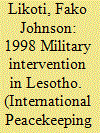

|
|
|
|
|
| Publication |
2007.
|
| Summary/Abstract |
The 1998 military intervention in Lesotho by South Africa and Botswana was shrouded in controversy. While South African officials claimed that the intervention was a Southern African Development Community (SADC) humanitarian peacekeeping mission to rescue Lesotho from a coup, the intervention appears to have been inconsistent with the UN Charter and with the SADC Treaty. Indeed, SADC had no role in legitimating this intervention because proposals relevant to coups had not been ratified by the SADC Summit. It would appear that the motivation for this intervention, at least on the part of South Africa, was to secure strategic resources, mainly water. National interest explains the intervention, rather than the rescue of a captive state as South Africa claimed.
|
|
|
|
|
|
|
|
|
|
|
|
|
|
|
|
| 2 |
ID:
076742
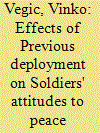

|
|
|
|
|
| Publication |
2007.
|
| Summary/Abstract |
This article is based on surveys in Slovenian contingents which operated as part of SFOR in 2003-04. It explores differences between soldiers who had joined the mission for the first time and those with previous experience. Data analysis focused on soldiers' motivations and personal morale, their expectations regarding the external mission environment and the level of social support at home. The effects of previous experience were found in the way that soldiers conceived their role in the peace operation, in the perception of social support at home and in the type of motivation. As a result of previous deployment, soldiers' beliefs that they could positively contribute to the situation in the area of operation diminished. However, in the case of redeployment, soldiers' motivation remained high but was supported by more utilitarian factors. Perceived public support and reactions from family surroundings also changed as a result of previous deployment experience
|
|
|
|
|
|
|
|
|
|
|
|
|
|
|
|
| 3 |
ID:
076740


|
|
|
|
|
| Publication |
2007.
|
| Summary/Abstract |
This article offers a critical perspective on the Human Security Doctrine for Europe both from a global and regional (Balkan) perspective. Having securitized the human security concept, the doctrine tries to legitimize a certain global political agenda that is based on the understanding of human security as a justification for an emerging system of global governance. Instead of promotion of the EU as a peace project, the doctrine may serve as one more instance of the ongoing militarization of the Union. One can argue that its value to recipient countries would be small, while it serves to boost the EU's ambitions to become a serious actor in a world dominated by biopolitical rationale. The article argues that, instead of being a form of foreign and security policy of global actors, human security should rather be promoted as a form of internal policy focused on human rights, especially in the socioeconomic sphere in post- or pre-conflict societies.
|
|
|
|
|
|
|
|
|
|
|
|
|
|
|
|
| 4 |
ID:
076738
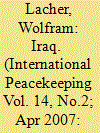

|
|
|
|
|
| Publication |
2007.
|
| Summary/Abstract |
In the literature on post-conflict reconstruction, the intervention in Iraq has been understood as an exception to, if not an aberration from, contemporary state-building. This article argues that whether Iraq is an exception to, or the epitome of post-conflict reconstruction depends on the genealogy one attributes to the latter. Denying that Iraq is an exemplary instance of contemporary reconstruction means neglecting the continuities of state-building from interwar trusteeship via Germany and Vietnam to the contemporary reproduction of the neoliberal model - continuities which the example of Iraq exposes more clearly than prior cases. An outline of the genealogy of state-building and an analysis of Iraqi reconstruction both point to the reproduction of a hegemonic international order as the rationale of statebuilding now and then.
|
|
|
|
|
|
|
|
|
|
|
|
|
|
|
|
| 5 |
ID:
076737


|
|
|
|
|
| Publication |
2007.
|
| Summary/Abstract |
Peacebuilding is a contested concept which gains meaning as it is practised. While academic and policy-relevant elaboration of the concept is of interest to international experts, interpretations of peacebuilding in the Central Asian arena may depart immensely from those envisaged within the western-dominated 'international community'. This article opens up the dimensions and contingent possibilities of 'peacebuilding' through an investigation of two alternative approaches found in the context of Tajikistan. It makes the critique that peacebuilding represents one contextually grounded basic discourse. In the case of Central Asia, and in particular post-conflict Tajikistan, at least two other basic discourses have been adopted by parties to the post-Soviet setting: elite mirostroitelstvo (Russian: peacebuilding) and popular tinji (Tajik: wellness/peacefulness). Based largely on fieldwork conducted in Tajikistan between 2003 and 2005, the argument here is that none of these three discourses is merely an artificial or cynical construct but that each has a certain symbolic and normative value. Consequently, a singular definition of Tajik 'peacebuilding' proves elusive as practices adapt to the relationships between multiple discourses and identities in context. The article concludes that 'peacebuilding' is a complex and intersubjective process of change entailing the legitimation of new relationships of power.
|
|
|
|
|
|
|
|
|
|
|
|
|
|
|
|
| 6 |
ID:
076741


|
|
|
|
|
| Publication |
2007.
|
| Summary/Abstract |
Based on research undertaken in southern Serbia following the introduction of multi-ethnic policing units, this article examines the pluralist intentions behind attempts to democratize security through community-oriented policing (COP). It details the achievements and the limitations of attempts to institute multi-ethnic policing as a foundational strategy for COP. Evidence is presented that the reforms did not sufficiently empower local actors over centralized institutions. The article illustrates the limitations of COP, arguing that de-securitization requires the creation of spaces wherein the local order being maintained by a locally accountable police is open to deliberation.
|
|
|
|
|
|
|
|
|
|
|
|
|
|
|
|
| 7 |
ID:
076736
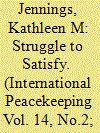

|
|
|
|
|
| Publication |
2007.
|
| Summary/Abstract |
This article calls for a re-examination of the justification, formulation and implementation of DDR programming in certain post-conflict environments. Qualitative fieldwork among ex-combatants in Monrovia, Liberia, suggests that the extent and form of DDR programming must be more sensitive to and predicated on context, accounting for conflict histories and current socioeconomic conditions and local institutional capacity. Moreover, in some post-conflict societies, a better use of international community resources may be to delink disarmament and demobilization from reintegration, focusing reintegration resources instead on open-access jobs programmes with discrete, complementary bilateral or multilateral programmes for particularly vulnerable groups.
|
|
|
|
|
|
|
|
|
|
|
|
|
|
|
|
| 8 |
ID:
076735
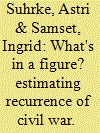

|
|
|
|
|
| Publication |
2007.
|
| Summary/Abstract |
It is often said that a country that has experienced civil war has nearly a 50 per cent risk of sliding back into war within five years. This has been widely cited in the academic literature and in policy debates, including in UN documents and preparatory work for the establishment of the UN Peacebuilding Commission. A closer examination of the origins, circulation and establishment of this figure gives a glimpse into the process whereby academic findings are converted into conventional wisdom and effectively inserted into the policy debate, even though the findings themselves are unstable. In this case, the authors of the original figure revised their initial 50 per cent estimate down to around 20 per cent only four years after their first study, but the change was barely noted. This article examines the process whereby the findings were made, and offers a note of caution about the wholesale adoption of such figures by policymakers and academics.
|
|
|
|
|
|
|
|
|
|
|
|
|
|
|
|
|
|
|
|
|